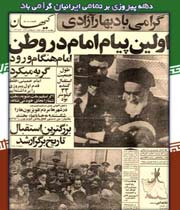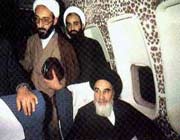Iran’s Islamic Revolution events (22 Bahman 1357)

Army units converging on Tehran from the provinces.
Tanks battle the people in the streets of Tehran - hundreds killed and thousands wounded.
‘We hereby request that you declare your opinion and edict on the issue of forsaking this oath [to defend the Shah and the Imperial regime] and joining the Islamic movement.’ -- Letter to Ayatollah Khomeini by a group of army officers
‘Those who have taken such an oath should act contrary to it.’ -- Ayatollah Khomeini, in response
All of east of Tehran comes under control of people and air force cadets.
6:00 am:
Bakhtiar requests to see Gharabaghi in his office at 9:30 am. Gharehbaghi says that he has a meeting with force commanders in an hour to receive a report on the overall situation in the country, and that he will go to the prime minister’s office following this meeting.
8:30 am:
Eng. Jafroudi arranges a joint meeting between Bakhtiar, Gharabaghi, Bazargan, and Ayatollah Mottahari, in his house, at 4:00 in the afternoon.
9:00 am:
Bakhtiar makes a phone call to Alavi School. He talks with Amir Entezam, stressing that he is going to hand in his resignation to Bazargan the same afternoon.
10:00 am:
Bakhtiar meets with US ambassador Sullivan in his office and requests his help. He leaves afterward to appear before the Senate.
10:30 am:
Meeting of the High Council of the Armed Forces in the War Room of the Army High Command HQ. This is the only place in Tehran which appears calm now. Tanks have blocked the old Shemiran road and do not permit people to approach the headquarters. 27 military commanders form the largest meeting ever in the history of the Imperial Armed Forces of Iran. They had never gathered around each other under one roof before.
The meeting begins...
‘Since SAVAK has been disbanded and its offices torched, I have nothing to report’. -- General Nasser Moghadam, head of SAVAK
‘The ground forces, which essentially were not in a good position to begin with, are now incapable of any action as of last night.’ -- General Badrei, army commander.
‘Our forces are under fire - I was a virtual prisoner myself and crawled my way to the rooftop to reach the helicopter to get here.’ -- General Rabiei, air force commande.
The first words of discord in the meeting are spoken by General Houshang Hatam, deputy to the chief of staff:
‘His majesty has left, and according to the prime minister, is not going to return. Mr. Bakhtiar wishes to declare a Republic. Ayatollah Khomeini is after an Islamic Republic and the whole nation is supportive of him. I propose that the armed forces should pull away from this political fighting and do not interfere.’
Everybody’s eyes are now directed at General Fardoust who has appeared for the first time in such meetings, and all consider him the person closest to the Shah and his de facto voice:
‘The law has specified the duty of the armed forces, which entails safeguarding the territorial integrity of Iran against a foreign army -- that is it.’

1:00 pm:
The text of the final Communiqué of the High Council of the Iranian Armed Forces is read, having been announced earlier, on the radio news:
‘The armed forces of Iran have had the duty of defending the independence and territorial integrity of our dear Iran, and up to now have attempted to fulfill this responsibility in the best manner possible, vis a vis the internal disturbances, by supporting the legal governments in charge.
Considering the recent events, the High Council of the Armed Forces met at 10:30 am today, 22 Bahman 1357, and unanimously decided to declare its neutrality in the present political conflicts with the aim of preventing further chaos and bloodshed. Military units have been ordered to return to their barracks.
The armed forces of Iran have always been and will always be the guardian and source of support for the noble and patriotic nation of Iran, and support, with all their might, the demands of this noble nation.’
Ayatollah Taleghani’s office receives a message from the group of Iranian Radio/TV workers who are on strike, stating that military personnel and the few Radio/TV employees, who were still working, are in the process of leaving the studios. He writes a message to the striking workers, asking them to return to work immediately.
The tanks had just arrived at Shemiran Avenue (which is no longer called Pahlavi by anyone) when, after a few seconds of silence in broadcasts, the voice of Jamshid Adili comes on the air:
‘This is the voice of the revolution of the Iranian people!’
Source: Tebyan
Add new comment